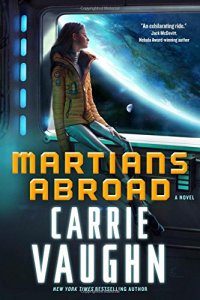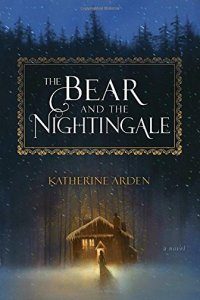2017 Year-in-Review by Carolyn Cushman
 Usually the bulk of my reading is fantasy, but some noteworthy SF titles snuck in this year. I particularly enjoyed Jim C. Hines’s Terminal Alliance, a humorous military SF adventure featuring zombie janitors in space – but they’re wonderfully dangerous janitors, and the gradual revelation of the truth about how humanity came to this state is a gripping part of this first volume in the Janitors of the Post-Apocalypse series. More military adventure continues in Tanya Huff’s A Peace Divided, the second volume in the Peacekeeper series (a continuation of the Confederation of Valor series), in which ex-marine Torin Kerr and her crew have to work with former enemies to rescue researchers kidnapped while exploring ruins of a lost civilization, with the wild mix of aliens providing plenty of entertainment even as the tension builds. Elizabeth Moon makes a welcome return to the world of her Vatta’s War series with the first volume in the sequel series, Vatta’s Peace, which finds Ky Vatta struggling to survive after a shuttle crash on her homeworld leaves her stranded with other passengers in a remote frozen place. Carrie Vaughn’s Martians Abroad is a fun update of Heinlein’s Podkayne of Mars, with the adventures of Polly, a third-generation Martian colonist forced to go to an upscale boarding school on Earth with her annoying brother. Martha Wells introduces one of my new favorite SF characters in the novella All Systems Red, the first in the Murderbot Diaries series following a damaged security android who has managed to free itself of its programming. It privately dubbed itself Murderbot, but so far its greatest crimes are illegally downloading and binge-watching soap operas – and distrusting the Corporation that owns it enough to save the exploratory scientific mission it’s with from deadly sabotage.
Usually the bulk of my reading is fantasy, but some noteworthy SF titles snuck in this year. I particularly enjoyed Jim C. Hines’s Terminal Alliance, a humorous military SF adventure featuring zombie janitors in space – but they’re wonderfully dangerous janitors, and the gradual revelation of the truth about how humanity came to this state is a gripping part of this first volume in the Janitors of the Post-Apocalypse series. More military adventure continues in Tanya Huff’s A Peace Divided, the second volume in the Peacekeeper series (a continuation of the Confederation of Valor series), in which ex-marine Torin Kerr and her crew have to work with former enemies to rescue researchers kidnapped while exploring ruins of a lost civilization, with the wild mix of aliens providing plenty of entertainment even as the tension builds. Elizabeth Moon makes a welcome return to the world of her Vatta’s War series with the first volume in the sequel series, Vatta’s Peace, which finds Ky Vatta struggling to survive after a shuttle crash on her homeworld leaves her stranded with other passengers in a remote frozen place. Carrie Vaughn’s Martians Abroad is a fun update of Heinlein’s Podkayne of Mars, with the adventures of Polly, a third-generation Martian colonist forced to go to an upscale boarding school on Earth with her annoying brother. Martha Wells introduces one of my new favorite SF characters in the novella All Systems Red, the first in the Murderbot Diaries series following a damaged security android who has managed to free itself of its programming. It privately dubbed itself Murderbot, but so far its greatest crimes are illegally downloading and binge-watching soap operas – and distrusting the Corporation that owns it enough to save the exploratory scientific mission it’s with from deadly sabotage.
On the fantasy side, Anne Bishop’s Etched in Bone, the fifth volume in her urban fantasy series set in the world of the Others, brings a sweet conclusion to the story arc involving Meg Corbyn and Simon Wolfgard – but first they have to deal with an abusive petty criminal who nonetheless causes great trouble when he joins his family in the Courtyard. A number of new fantasy series had promising starts. D.J. Butler did some fascinating things with American history in the alternate-history epic fantasy Witchy Eye, set in an intriguing version of an early US with magic, ruled by a cruel emperor, and one young woman, unaware of her true ancestry, who could change everything. Vivian Shaw’s unusual and entertaining urban fantasy Strange Practice introduced Doctor Greta Helsing, who treats the “differently alive,” including some well-known vampires, and ends up saving London from an evil cult. Wen Spencer’s The Black Wolves of Boston, first in the eponymous series, is a thoroughly charming urban fantasy romp with a bunch of engaging characters, set in a fascinating world where werewolves are secretly the protectors of human civilization against the supernatural. When one unaware dorky teen discovers he’s a werewolf, he goes on the run to protect his family, is pursued by evil witches, and finds refuge with a suicidal hipster vampire with a hoarding problem. I came late to Matt Wallace’s Sin du Jour series of darkly humorous novellas about a company that caters for the supernatural and has to keep saving the world from supernatural schemes at events they work; touches of satire, intriguing crew interactions, and some truly horrifying situations give the series a delicious edge, even when the evil verges on cartoony; new in 2017 were the fourth through sixth installments: Idle Ingredients, Greedy Pigs, and Gluttony Bay. Tad Williams’ The Witchwood Crown is the first in the Last King of Osten Ard trilogy, sequel to his acclaimed Memory, Sorrow, and Thorn trilogy; the novel starts out slow and soon gets grim, as the empire shows signs of fracturing even as the Norns start to rise again, but the story builds powerfully, suggesting this new trilogy is going to be a major work of epic fantasy.
 Not many first novels impressed me this year, but Katherine Arden’s The Bear and the Nightingale is a beautiful fantasy based on Russian folk tales, following a young noblewoman in medieval Russia dealing with deadly cold winters, dark magic, and religious fanaticism. In The Guns Above, Robyn Bennis spun a delightful adventure in a steampunkish world where one country’s first female airship captain manages to dramatically save the day, despite a scheming general and the foppish spy he plants on board. Young-adult fantasy first novel The Black Witch by Laurie Forest is a powerful exploration of prejudice, the first in a series following a group of oppressed teens who begin to see the world differently at university, as conflict heightens between this world’s varied peoples. I enjoyed it, but some people have found it problematic, since the female protagonist, however abused, is of the ruling, oppressor class.
Not many first novels impressed me this year, but Katherine Arden’s The Bear and the Nightingale is a beautiful fantasy based on Russian folk tales, following a young noblewoman in medieval Russia dealing with deadly cold winters, dark magic, and religious fanaticism. In The Guns Above, Robyn Bennis spun a delightful adventure in a steampunkish world where one country’s first female airship captain manages to dramatically save the day, despite a scheming general and the foppish spy he plants on board. Young-adult fantasy first novel The Black Witch by Laurie Forest is a powerful exploration of prejudice, the first in a series following a group of oppressed teens who begin to see the world differently at university, as conflict heightens between this world’s varied peoples. I enjoyed it, but some people have found it problematic, since the female protagonist, however abused, is of the ruling, oppressor class.
In young-adult fantasy, Megan Whalen Turner returned to her noted Thief series for fifth volume Thick as Thieves, following a once-powerful slave in the Mede empire, who has to go on the run and is persuaded to seek sanctuary in enemy Attolia; it’s not the best in the series, but definitely worthwhile. Kristin Cashore’s Jane, Unlimited defies categorization, mixing crime and art, magic and weirdness in a fascinating account of a grieving young woman who visits a wealthy family’s grand estate and ends up with a choice of five possible paths to take; the novel shows what would happen with each, and some of them get truly creepy. Several middle-grade novels caught my fancy: Cassie Beasley’s Tumble and Blue follows a family with a peculiar, and strangely dark problem – its members all get either a gift or a curse, which tend to come in pairs: protagonist Blue always loses, while his dad always wins, but Blue’s new friend, would-be hero Tumble, decides to change things, with initially disastrous results. The Dragon with a Chocolate Heart by Stephanie Burgis is a sweet middle-grade fantasy about a young dragon turned human, who discovers the joy of chocolate and decides to get work as a chocolatier’s apprentice. Scarlett Thomas’s Dragon’s Green presents some intriguing book-based magic in a world where a “worldquake” set technology back to around 1992.
Carolyn F. Cushman, Senior Editor, has worked for Locus since 1985, the longest of any of the current staff, and handles our in-house books database, writes our New and Notable section, and does the monthly Books Received column. She is a graduate of Western Washington University with a degree in English. She published a fantasy novel, Witch and Wombat, in 1994.
This article and more like it in the February 2018 issue of Locus.
 While you are here, please take a moment to support Locus with a one-time or recurring donation. We rely on reader donations to keep the magazine and site going, and would like to keep the site paywall free, but WE NEED YOUR FINANCIAL SUPPORT to continue quality coverage of the science fiction and fantasy field.
While you are here, please take a moment to support Locus with a one-time or recurring donation. We rely on reader donations to keep the magazine and site going, and would like to keep the site paywall free, but WE NEED YOUR FINANCIAL SUPPORT to continue quality coverage of the science fiction and fantasy field.





